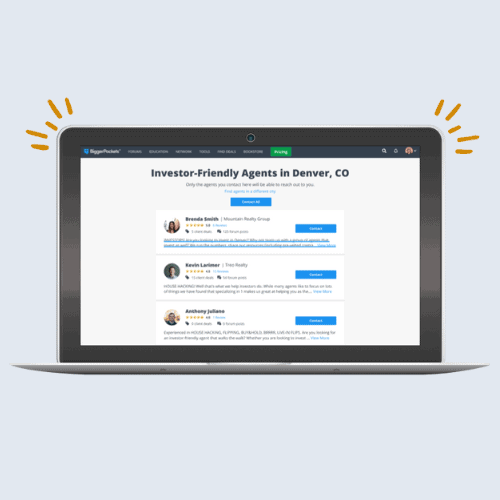The saying goes, “Only those who dare to fail greatly can ever achieve greatly.” Sometimes, it’s really those mistakes that teach us the most.
We talked to three investors about their biggest mistakes and what they learned from making them.
Considering Renovation Costs is Key
Ali and Josh Lupo are full-time real estate investors (on Instagram as theficouple) who invest in the Albany, New York, area.
The big mistake
Woefully underestimating renovation costs and failing to have someone with more experience walk a property with us. On our second house hack, we rushed the inspection and underestimated the repairs by more than $20,000. We ended up needing new windows, new HVAC, new flooring, and a new kitchen. Many of these expenses could have been negotiated during closing if we had taken the time to consult a professional.
What it taught us
Now, whenever we tour a property, we have a general contractor with 20-plus years of experience tour with us. This costs us $200 to $250 for their time; however, it helps us better identify large repair bills [in advance] that we can use to negotiate with the seller for credits or [decide to] simply walk away.
Investing is a Business—Be Organized and Prepared
Katie Newman is an ER nurse turned investor. She has a single-family home rental in Chattanooga, Tennessee, and a medium-term rental in Alexandria, Virginia.
The big mistake
Being a beginner and never having owned a business before (I’ve worked in healthcare for over 15 years), the biggest mistake I think I’ve made so far is not taking my real estate investing seriously and not treating it like a business from the beginning.
I have a property manager that manages my long-term rental in Tennessee, but with both my medium-term rental and my long-term rental, I had absolutely nothing set up business-wise to protect myself when I started investing. This ranged from having no business bank account to separate my income from personal income, no separate email or phone numbers aside from my personal accounts, no CPA or help when I had to file taxes, no clue how to even create leases or get tenants to pay deposits/rent, etc.
I wouldn’t say this is a huge fail or anything where I lost tons of money, but man, I think I could have avoided a lot of headaches and time with different rental incomes, tenant leads, tenant contacts, etc. if I had been a little bit more set up at the beginning versus winging the whole thing.
What it taught me
I obviously had to figure things out on the fly (for example, I had to call three friends after I had a tenant want to rent my medium-term rental property because I didn’t even know what to do to get a tenant to sign a lease, let alone background check them or get them to pay a deposit). Since then, I’ve created better systems for communication with tenants by establishing ‘business hours’ for contact[ing me], changing email and my number for tenants to contact me, and creating better systems/SOPs for contact with my tenants/property manager, so it’s much more organized.
I’ve definitely learned from my mistakes, and since having my properties, I’ve set myself up better to function as a business owner versus someone that just has a couple of properties. I have better accounting and bookkeeping for my expenses and taxes, better communication for potential tenants and current tenants that don’t involve personal numbers, and other basic business frameworks for the future.
The biggest lesson I learned from this small but really annoying mistake is that if you learn to establish and treat your rentals as a business from the beginning, your ducks will be more in a row for when I intend to scale my portfolio down the line.
Listen to Your Property Inspector
Sam Dolciné is an investor and podcast host (Black Real Estate Dialogue) who invests in the Dayton, Ohio, area.
The big mistake
When I had the inspection for my first property done, I read it thoroughly (at least I thought I did) and provided a long list of things that I wanted repaired. Many of those things ended up getting repaired.
Two years later, when a new tenant moved in, the HVAC system went out completely and was beyond repair. The first thing I did was look back at the inspection report and [saw that] my inspector flagged that the HVAC system was near the end of its useful life and maybe had a few years left. I wish I paid attention to it and asked them to repair the system. Maybe it was a rookie mistake or [me] just being nervous to inquire about something like that.
What it taught me
In the end, I ended up getting fans for the tenants, since it was almost fall, and then using their rent payments to replace the HVAC system in the spring for $2,000. I was not excited to have to pay for this, but it’s the cost of a mistake.
The next property I purchased, I was meticulous about the status of big-ticket items like the HVAC system. I communicated with my inspector after the inspection to discuss various parts of the report to make sure I understood what I was getting into.
Nobody is perfect, even the most experienced investor. You will make mistakes, and sometimes the same mistakes. Don’t give up, and make sure you learn from your mistakes. Strive to do a little better every time.
Join the community
Ready to succeed in real estate investing? Create a free BiggerPockets account to learn about investment strategies; ask questions and get answers from our community of +2 million members; connect with investor-friendly agents; and so much more.
Note By BiggerPockets: These are opinions written by the author and do not necessarily represent the opinions of BiggerPockets.

